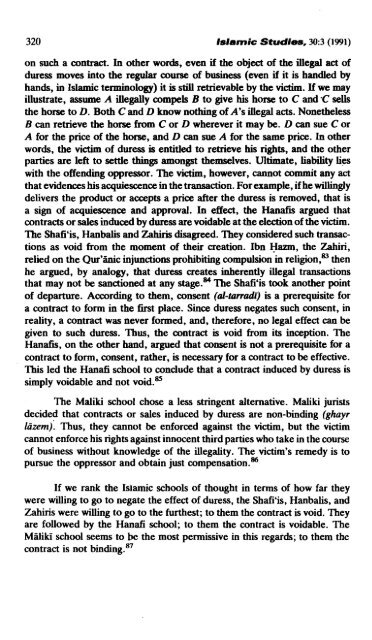LAW OF DURESS IN ISLAMIC LAW AND COMMON LAW: A ...
LAW OF DURESS IN ISLAMIC LAW AND COMMON LAW: A ...
LAW OF DURESS IN ISLAMIC LAW AND COMMON LAW: A ...
You also want an ePaper? Increase the reach of your titles
YUMPU automatically turns print PDFs into web optimized ePapers that Google loves.
320 Islamic Studies, 30:3 (1991)<br />
on such a contract. In other words, even if the object of the illegal act of<br />
duress moves into the regular course of business (even if it is handled by<br />
hands, in Islamic terminology) it is still retrievable by the victim. If we may<br />
illustrate, assume A illegally compels B to give his horse to C and % sells<br />
the horse to D. Both C and D know nothing of A's illegal acts. Nonetheless<br />
B can retrieve the horse from C or D wherever it may be. D can sue C or<br />
A for the price of the horse, and D can sue A for the same price. In other<br />
words, the victim of duress is entitled to retrieve his rights, and the other<br />
parties are left to settle things amongst themselves. Ultimate, liability lies<br />
with the offending oppressor. The victim, however, cannot commit any act<br />
that evidences his acquiescence in the transaction. For example, if he willingly<br />
delivers the product or accepts a price after the duress is removed, that is<br />
a sign of acquiescence and approval. In effect, the Hanafis argued that<br />
contracts or sales induced by duress are voidable at the election of the victim.<br />
The Shafi'is, Hanbalis and Zahiris disagreed. They considered such transactions<br />
as void from the moment of their creation. Ibn Hazm, the Zahiri,<br />
relied on the Qur'hic injunctions prohibiting compulsion in religi~n,'~ then<br />
he argued, by analogy, that duress creates inherently illegal transactions<br />
that may not be sanctioned at any stage." The Shafi'is took another point<br />
of departure. According to them, consent (al-tarrudi) is a prerequisite for<br />
a contract to form in the first place. Since duress negates such consent, in<br />
reality, a contract was never formed, and, therefore, no legal effect can be<br />
given to such duress. Thus, the contract is void from its inception. The<br />
Hanafis, on the other hand, argued that consent is not a prerequisite for a<br />
contract to form, consent, rather, is necessary for a contract to be effective.<br />
This led the Hanafi school to conclude that a contract induced by duress is<br />
simply voidable and not void.''<br />
The Maliki school chose a less stringent alternative. Maliki jurists<br />
decided that contracts or sales induced by duress are non-binding (ghayr<br />
kern): Thus, they cannot be enforced against the victim, but the victim<br />
cannot enforce his rights against innocent third parties who take in the course<br />
of business without knowledge of the illegality. The victim's remedy is to<br />
pursue the oppressor and obtain just compen~ation.~<br />
If we rank the Islamic schools of thought in terms of how far they<br />
were willing to go to negate the effect of duress, the Shafi'is, Hanbalis, and<br />
Zahiris were willing to go to the furthest; to them the contract is void. They<br />
are followed by the Hanafi school; to them the contract is voidable. The<br />
MHliki school seems to be the most permissive in this regards; to them the<br />
contract is not binding.87
















